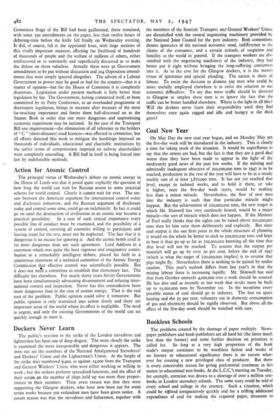Action for Atomic Control
The principal virtue of Wednesday's debate on atomic energy in the House of Lords was that it posed quite explicitly the question of how long the world can wait for Russian assent to some practical scheme for world control. Clearly it cannot wait for ever. The see- saw between the American argument for international control today and disclosure tomorrow, and the Russian argument of disclosure today and control some time, could go on indefinitely. In fact it could go on until the destruction of civilisation in an atomic war became a practical possibility. In a case of such crucial importance every possible line of conduct must be examined, and the possibility of a system of control, covering all countries willing to participate and leaving room fur the rest, must not be neglected. The fact that it is dangerous is no excuse for ignoring it. And the atomic bomb itself is far more dangerous than any such agreement. Lord Addison in a statement which was quite the least vigorous and imaginative contri- bution to a remarkably intelligent debate, placed his faith in a unanimous statement of a technical committee of the Atomic Energy Commission that effective control was scientifically possible. But it does not netd a committee to establish that elementary fact. The difficulty lies elsewhere. For nearly thirty years Soviet Governments have been simultaneously advocating disarmament and refusing inter- national control and inspection. Never has this contradiction been more dangerous than in the case of atomic energy. That is the real root of the problem. Public opinion could solve it tomorrow. But public opinion is only translated into action slowly and there are important areas of the world where its effect is negligible. The need is urgent, and only the existing Governments of the world can act quickly enough to meet it.


































 Previous page
Previous page